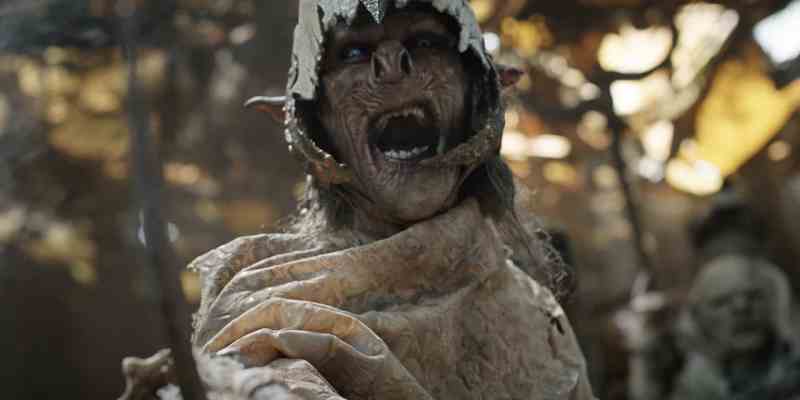This discussion and review contains spoilers for the two-episode premiere of The Lord of the Rings: The Rings of Power, “Shadow of the Past” and “Adrift,” on Amazon Prime Video.
There’s a fascinating contradiction at the heart of the two-episode premiere of The Lord of the Rings: The Rings of Power, a push-and-pull between the past and future of the television fantasy genre. This is a show that appears to be navigating a treacherous and narrow path, attempting to craft a celebration of one of fantasy’s defining texts while also acknowledging how radically the genre has changed even in the 20 years since Peter Jackson released his Lord of the Rings trilogy.
At this stage, it is almost pointless to provide the background context for The Rings of Power. The first season reportedly cost Amazon $715M. That is almost three times the estimated $270M budget for the most recent season of Stranger Things and over three-and-a-half times the (reportedly just under) $200M budget for the first season of House of the Dragon. By most accounts, the success or failure of The Rings of Power could be make or break for Amazon’s foray into Hollywood.
Watching the first two episodes of The Rings of Power, one can feel that pressure at the edge of the frame. This is a show that is very conscious that it needs to be a four-quadrant hit, that it needs to provide Amazon with a buzzy breakout hit that surpasses even The Boys in popularity. From the outset, this is a show that is aware that it needs to be all things to all people — and that it needs to be all of those things very quickly indeed.
The result is a show with complicated relationships to its antecedents. The Rings of Power is obviously an adaptation of the work of J.R.R. Tolkien. In fact, it enjoys the cooperation of the Tolkien estate, with Amazon reportedly paying out $250M for the rights. However, there is another shadow hanging over this version of Middle-earth. To the general public, this fantasy world was defined by Peter Jackson’s gigantic adaptation of The Lord of the Rings.
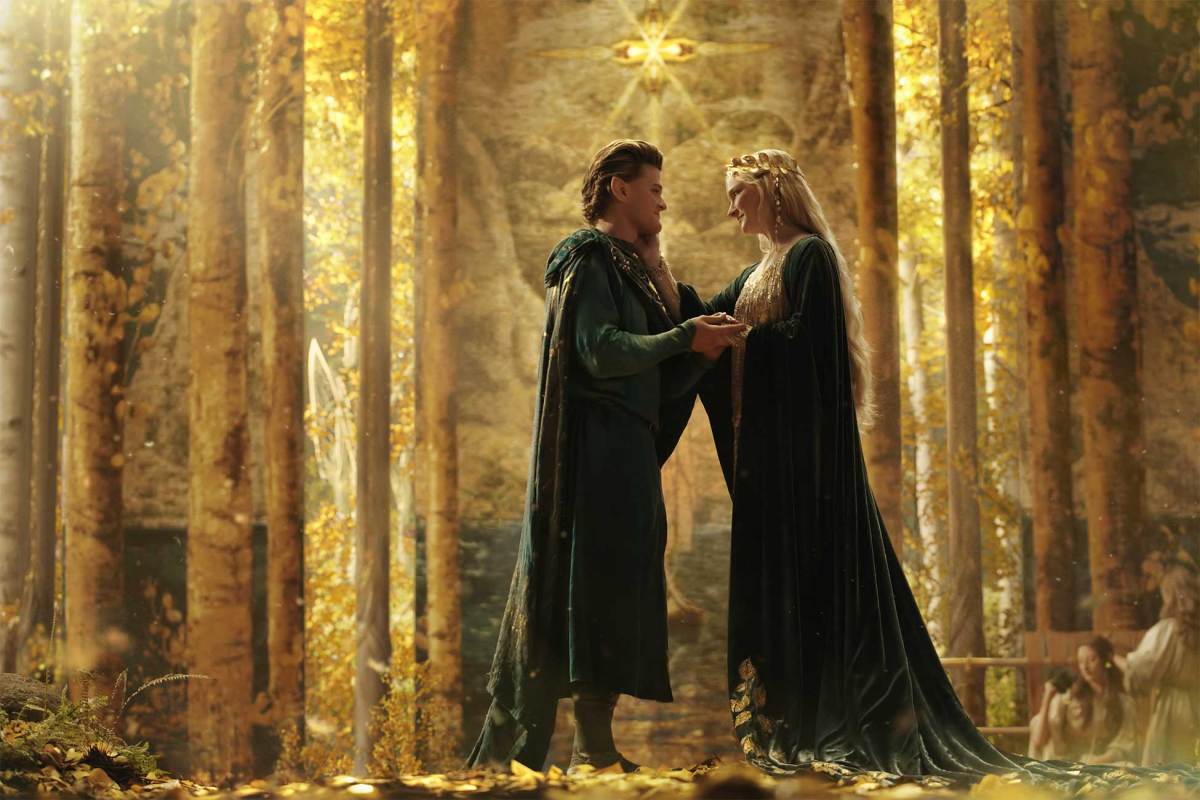
The Rings of Power is very obviously caught in the gravity of Peter Jackson’s adaptation. Although the second season will reportedly film in Britain, the first season shot in New Zealand and so skillfully recreates the trilogy’s eye-catching visuals. Ramsey Avery’s production design captures a lot of the texture associated with the films. Bear McCreary’s score echoes Howard Shore’s beautiful soundscape for those three feature films. There’s a sense of trying to conjure the memory of those films back into reality.
Similarly, the narrative structure of The Rings of Power is designed to evoke memories of those earlier films. Both the film and show open with an extended expository monologue from the elf Galadriel, played in the movies by Cate Blanchett and in the series by Morfydd Clark. The Lord of the Rings introduces Bilbo (Ian Holm) drafting his history of Middle-earth, similar to how The Rings of Power establishes Elrond (Robert Aramayo) in his earliest scenes.
Though the two stories are separated by millennia, they unfold in similar contexts. The Lord of the Rings takes place after Sauron has been defeated and banished, but with the implication that he has been secretly gathering his power in the darkness. The Rings of Power takes place in the aftermath of another conflict in which Sauron has been defeated and banished, but also with the implication that he has been secretly gathering his power in the darkness. Plus ça change, eh?
The Rings of Power is heavy-handed in affirming its links to The Lord of the Rings, often hammering them as hard as Elrond and Durin IV (Owain Arthur) hammer those rocks. Even to those without knowledge of the core mythology, the subplot focusing on elven smith Celebrimbor (Charles Edwards) is obviously heading in one direction from the moment he monologues about his ambition “to grow beyond petty works of jewel craft and devise something of real power.”
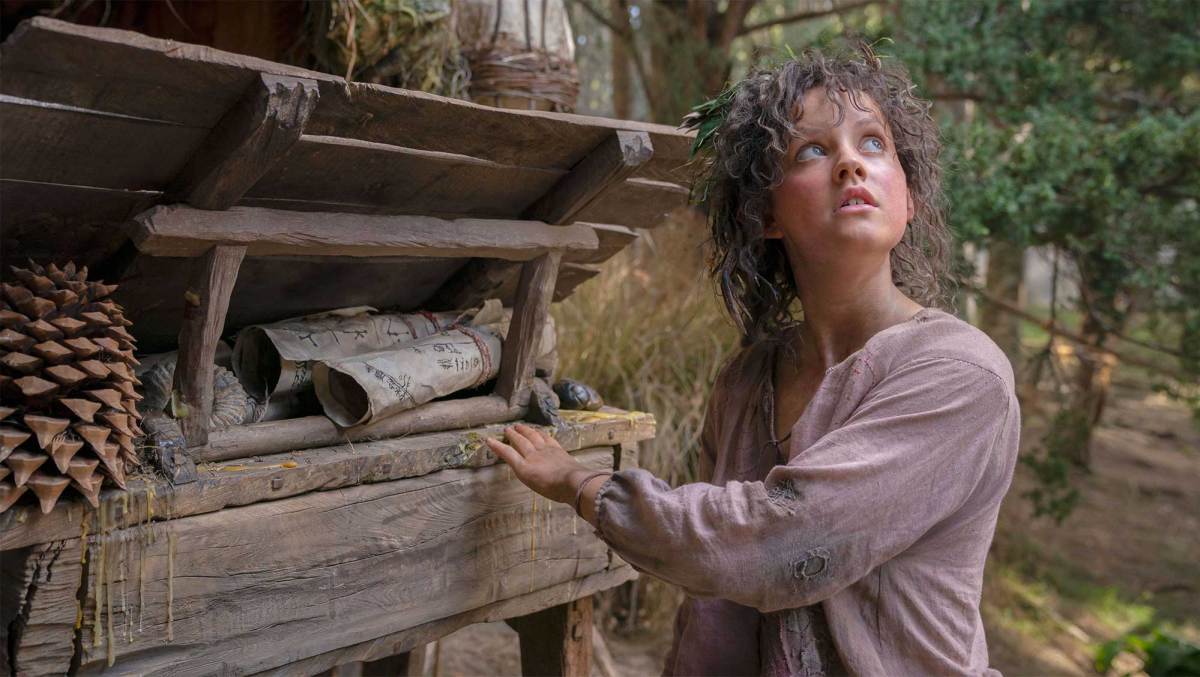
Similarly, there is something vaguely frustrating in the narrative shell game that The Rings of Power is setting up with the mysterious stranger (Daniel Weyman) who fell from the sky. It is obvious that he will turn out to have a strong tie to the mythos, that he will probably turn out to be a recognizable face from the books and films. The only question is which character. It feels very much like it’s setting up the sort of fan-servicey late-season reveals that undermine the Marvel shows.
However, The Rings of Power is caught in a strange position with regards to the earlier films. Amazon reportedly approached director Peter Jackson to be involved in the series, only to abruptly cut off communications without any warning. This may speak to the famously strained relationship between Jackson and the Tolkien estate. Christopher Tolkien argued that Jackson’s films “reduced the aesthetic and philosophical impact of the creation to nothing.”
The Rings of Power isn’t just caught between Jackson’s film adaptation and the Tolkien estate. There is also the simple reality that those films came out 20 years ago. They were game changers. They were the rare cinematic fantasy epic to truly break out into popular culture, and so they codified the visual language of the genre in film and television. However, they are also the objects that film and television fantasy has spent two decades reacting against.
The Rings of Power premieres just weeks after the record-breaking launch of House of the Dragon on HBO, a prequel series to the show that was often described as “the anti-Lord of the Rings.” It has often been argued that Game of Thrones was among the last vestiges of the monoculture, something that The Rings of Power needs to desperately restore if it is to be the hit that Amazon needs it to be. So The Rings of Power finds itself in conversation with its own deconstruction.
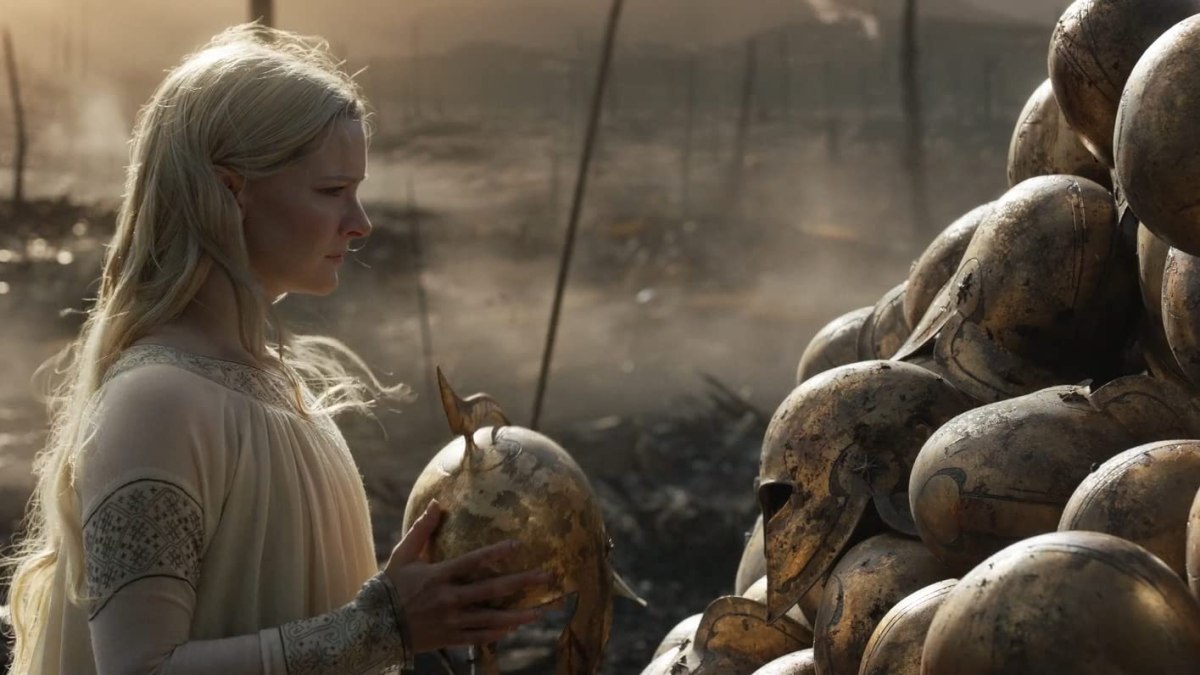
The biggest question hanging over The Rings of Power is whether audiences who have since embraced shows like Game of Thrones and House of the Dragon will embrace a fantasy epic that feels curiously old-fashioned. It is one of the challenges facing retro pulp adaptations. The source material for science fiction throwbacks like John Carter and Flash Gordon might have inspired Star Wars, but neither began zeitgeist-defining smashes in a post-Star Wars world.
The shadow of Game of Thrones looms large over The Rings of Power. The show seems to stem from Jeff Bezos’ mandate to Prime Video: “Bring me Game of Thrones.” The first post-exposition set piece recalls the opening moments of Game of Thrones, as an expedition through a frozen wasteland discovers something monstrous (and long-thought vanquished) lurking in the ice and snow. By the second part of the premiere, the fractured geographical narrative recalls the structure of Game of Thrones. The map transition effects even vaguely recall the opening credits of Game of Thrones.
That said, The Rings of Power appears — at least initially — to define itself in thematic opposition to Game of Thrones, adhering to J.R.R. Tolkien’s clearly defined moral worldview instead of the more ambiguous and relativist perspective of Game of Thrones. From its opening moments, focusing on a young Galadriel (Amelie Child Villiers) and her older brother Finrod (Will Fletcher), The Rings of Power positions itself as an epic narrative about good and evil, light and darkness.
“Do you know a ship floats when a stone cannot?” Finrod asks. “Because the stone sees only downwards. The darkness of the water is vast and irresistible.” Galadriel responds, “But sometimes the lights shine just as brightly reflected in the water as they do in the sky. It’s hard to say which way is up and which is down. How am I to know which lights to follow?” When Finrod responds, Galadriel protests, “But that seems so simple.” Finrod replies, “The most important truths often are.”
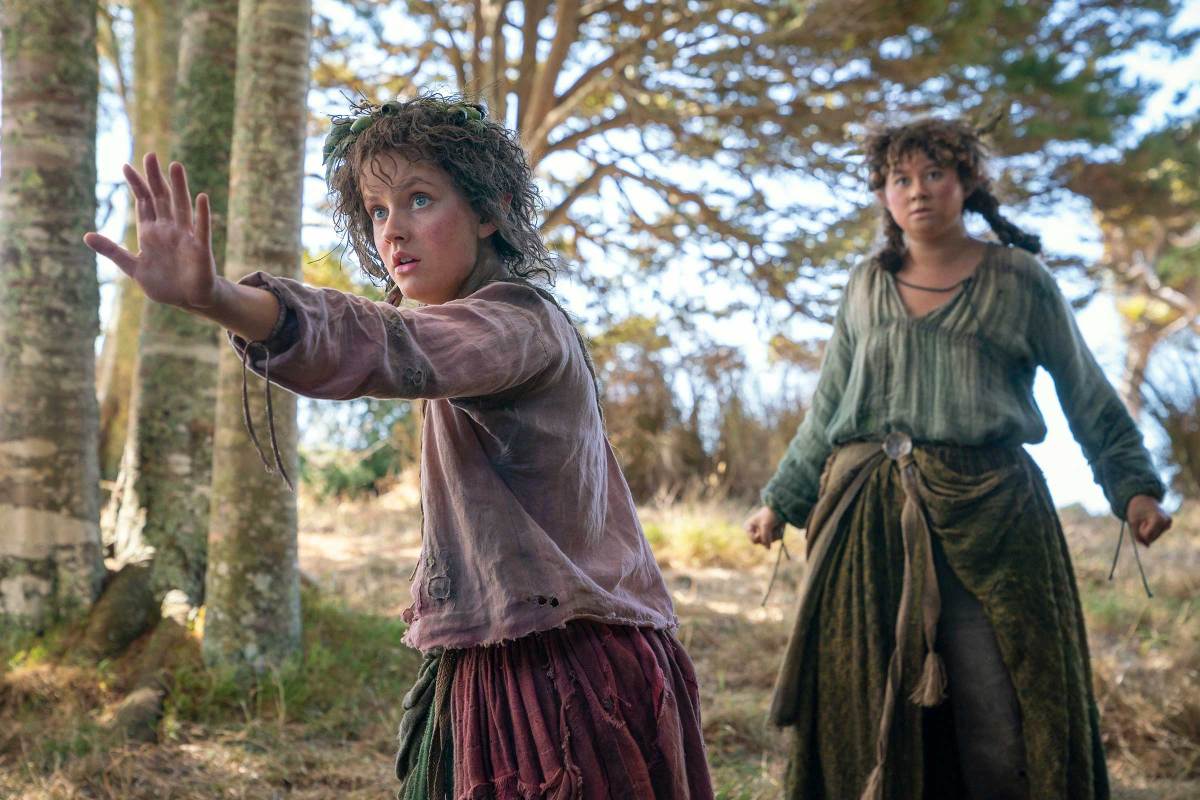
This is a simple dichotomy. In the world of The Rings of Power, good is simple and evil is senseless. Galadriel struggles to make sense of the brand that Sauron left on Finrod, to decode meaning from it. However, even the wisest elves cannot identify or parse Sauron’s brand, a symbol that haunts Galadriel and drives her fanatical pursuit of “the Enemy.” It’s a very straightforward premise, with clearly drawn lines between good and evil.
To be fair, the rest of the premiere does add some shading and ambiguity to this idea, most interestingly as it relates to Galadriel herself. The Rings of Power suggests that there’s an irony in Galadriel’s zealous pursuit of Sauron. “It is over,” Elrond assures Galadriel. “The evil is gone.” She points to her heart, demanding, “Then why is it not gone from in here?” This is an interesting and nuanced idea, if a little overly Nietzschean.
Explaining his refusal to let Galadriel continue her adventure, King Gil-galad (Benjamin Walker) warns Elrond, “We foresaw that if it had, she might have inadvertently kept alive the very evil she sought to defeat. For the same wind that seeks to blow out a fire might also cause its spread.” Indeed, Galadriel is the most compelling part of the two-episode premiere, and the second half loses focus as it drifts away from her to focus on less compelling characters.
“The past is with us all, whether we like it or not,” the elven hunter Arondir (Ismael Cruz Córdova) remarks in the first episode. That is certainly true of The Rings of Power, which feels both drawn to and trapped by its source material, as well as unsure how to navigate the two decades between the last major adaptation of these works. The real question is whether The Rings of Power can forge its own future.
